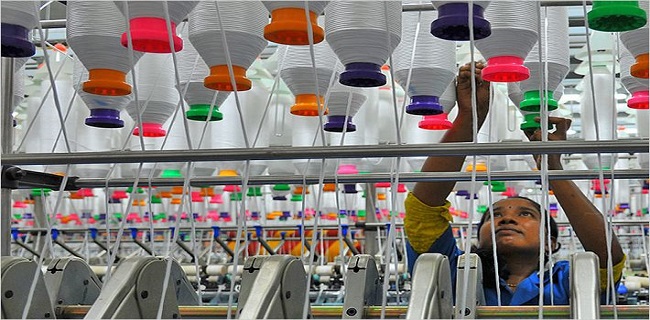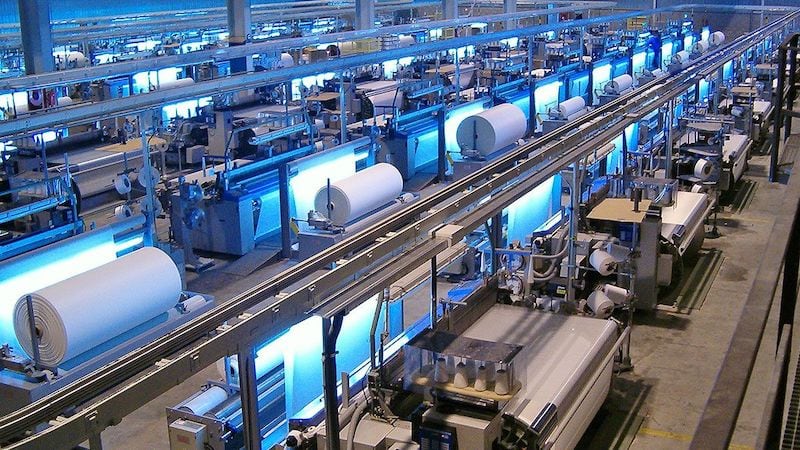The development of textile machinery processing has contributed significantly to the global growth of the textile industry. Spinning was born from hand spindles, and weaving was born from handloom.
The introduction of electric-powered machinery paved the way for today’s spinning, weaving, dyeing, printing, and finishing machinery.
From roughly 1760 until sometime between 1820 and 1840, the Industrial Revolution was a period of transition to new manufacturing processes.
During this time, hand production methods were replaced by machines, and new chemical and iron manufacturing procedures were adopted. The efficiency of water power improved, while the utilization of steam power rose.
The manufacturing system was growing, and machine tools were being produced. In terms of employment, output value, and capital invested, textiles were the most important industry during the Industrial Revolution. Textiles were also among the first industries to adopt contemporary manufacturing techniques. The Industrial Revolution began in Great Britain, and the British were responsible for the majority of the major technological breakthroughs.
the best countries in the Textile Machinery manufacturing sector are Germany, Italy, Switzerland, Spain, France, Belgium and the Netherlands. Also in the past decade, countries like Turkey, China, and India developed themselves a lot in the textile machinery manufacturing sector
When mills began to maintain their textile machines in their industrial workshops, textile machinery production began. They eventually began serious engineering work and terminated their ties with spinning and weaving mills. Separate textile machinery manufacturing workshops sprang up as a result of these independent ventures.
Top Manufacturers of Textile Machinery in the World
Currently, powerful companies are producing textile machinery. Switzerland and Germany are leading companies in the textile machinery industry. In addition, Belgium, Italy, Japan, and China are among the countries that produce high-tech textile machinery. In the following essay, top manufacturers of textile machinery are listed.
| Brand | Products | Country | Telephone | Website |
| Zimmer | Screen Printing Machines Digital Printing Machines Coating Machines Drying Machines |
Austria | +43 (5372) 64893-0 | https://www.zimmer-austria.com/ |
| Trützschler | Spinning Preparation Machines Man-made Fibers Machines Nonwoven Machines |
Germany | +49 2166 607 0 | https://www.truetzschler.de/ |
| Oerlikon | Man-made Fiber Spinning Systems Texturing Machines |
Switzerland | +41 58 36 96 96 | https://www.oerlikon.com/ |
| Rieter | Systems, products, components, and digitization solutions for short staple fiber spinning | Switzerland | +41 52 208 70 45 | https://www.rieter.com/ |
| Saurer | Pre-Spinning Machines Spinning Machines Winding Machines Twisting & Cabling Machines Embroidery Machines |
Switzerland | +41 44 384 41 11 | https://saurer.com/ |
| Biancalani | Textile finishing machines | Italy | +39 057454871 | https://www.biancalani.com/en/ |
| Dilo Group | Nonwoven Machines | Germany | +49 (0) 62 71 940-0 | https://www.dilo.de/en/ |
| BRÜCKNER | Textile Machinery | Germany | +49 7152 12 0 | https://www.brueckner-textile.com/en/ |
| Stoll | Flat Knitting Machines | Germany | 49-7121-313-450 | https://www.stoll.com/ |
| Karl Mayer | Warp Knitting Machines Warp Preparation Machines | Germany | +49(0)6104402-0 | https://www.karlmayer.com/ |
| Shima Seiki | Knitting Machines Design System/Software CAD/CAM Systems Inkjet Printing Machine PLM Solutions |
Japan | 81-73-474-8210 | https://www.shimaseiki.com/ |
| Mayer & Cie | Circular Knitting Machines Braiding Machines |
Germany | +49 (0)7432 700-0 | https://www.mayercie.com/ |
| Groz-Beckert | Knotting Machines | Germany | https://www.groz-beckert.com/ | |
| Picanol | Rapier Weaving Machines Air Jet Weaving Machines |
Belgium | +32 57 222 111 | https://www.picanol.be/ |
| Ruti | Projectile Weaving Machines | Switzerland | https://rutitextil.ch/ | |
| Staubli | Weaving Preparation Machines Jacquard weaving Machines Carpet Weaving Machines Sock Knitting Machines |
Switzerland | +41 81 725 01 01 | https://www.staubli.com/ |
| Lindauer Dornier | Rapier and Air-jet Weaving Machines Tape Weaving Machine 3D Weaving Machine |
Germany | +49 8382 703 0 | https://www.lindauerdornier.com/ |
| Santex Rimar Group | Weaving Machines Finishing Machines Technical Textile Machines |
Italy | +39 0445 1761444 | https://www.santexrimar.com/ |
| Vandewiele | Carpet Machines (Tufting – Extrusion – Heat Setting) | Belgium | +32 56 24 32 11 | https://www.vandewiele.com/ |
| Jacob Muller Group | Narrow Weaving Machines Knitting Machines Crochet Machines |
Switzerland | +41 62 865 51 11 | https://www.mueller-frick.com/ |
| M&R | Textile Screen Printing Equipment Direct to Garment T-shirt Printing Direct to Garment T-shirt Printing |
USA | +1 630-858-6101 | https://www.mrprint.com/ |
| MHS | Rotary Screen Printing Coating Machines |
Austria | +43 5373 20740 | http://www.mhms.at/ |
| Odesi | Liquid Dispensing & Solution Preparation Machines used in Textile Dyeing | Turkey | +90 212 671 80 10 | http://www.odesi.com.tr/ |
| Tupesa | Dyeing Machine Hoisery Machine |
Spain | +34 972 59 45 11 | https://www.tupesa.com/ |
| Juki | Sewing Machines | Japan | +81 42-357-2211 | https://www.juki.co.jp/ |
| Jack | Sewing Machines | China | +86 576 88177782 | http://en.chinajack.com/ |
| PRASHANT GROUP | Textile Machinery | India | +91-79-2583 0603 | www.prashantgroup.com |
The Modernization of Textile Machinery
The modernization of textile machinery is one of the most important issues in the world today. Undoubtedly, the more modern the mechanical equipment of the textile industry according to the standards of the world, the higher the speed and quality of production.
Upgrading textile machines will have consequences such as high speed, improved performance, easy maintenance, high efficiency, and increased accuracy. Today, more items of higher quality can be produced with less labor and running costs thanks to modern high-performance machinery and logical operating methods.

Conclusion
Nowadays, all textile producers across the world are working to enhance their equipment not just in terms of quality, productivity, and energy consumption but also to make processing more environmentally friendly. In addition, textile manufacturers must be able to adjust their production line in the shortest time and cost to maintain their position in today’s competitive market as well as respond to changing trends.
These issues are highly related to the machinery used by textile manufacturers. Thus, textile machinery producers are trying to improve their products in terms of productivity, energy consumption, sustainability, and flexibility to meet their customer’s needs.

































